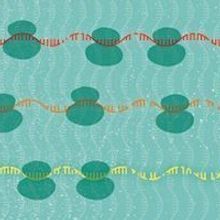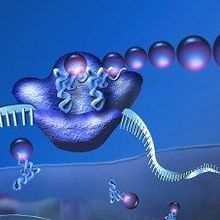Login
Subscriberibosomes, genetics & genomics

What Does It Look Like to “Turn On” a Gene?
Alla Katsnelson, Casey Rentz, and Knowable Magazine | May 3, 2019 | 8 min read
Only recently have scientists directly witnessed this most pivotal of events in biology, thanks to new technology that allows them to observe the process in living cells. It’s teaching them a lot.

Ribosomal DNA Copy Numbers Decrease in Some Cancers
Abby Olena, PhD | Jun 22, 2017 | 3 min read
An analysis of human cancer genome projects uncovers a counterintuitive loss of ribosomal gene copies.

Ciliates Are Genetic-Code Deviants
Karen Zusi | Sep 30, 2016 | 1 min read
Traditional stop codons have a double meaning in the protozoans' mRNA, sometimes calling for an amino acid during translation.

Scientists Catch Translation in the Act
Ruth Williams | Sep 30, 2016 | 1 min read
Newly developed techniques from four different groups rely on the same basic steps to track translation in live cells.

Noncoding RNAs Not So Noncoding
Ruth Williams | Jun 1, 2016 | 10+ min read
Bits of the transcriptome once believed to function as RNA molecules are in fact translated into small proteins.

Finding Mislabeled Noncoding RNAs
Ruth Williams | May 31, 2016 | 1 min read
Researchers scour the genome for micropeptides encoded within RNAs presumed to function in a noncoding capacity.

AAAAA Is for Arrested Translation
Ruth Williams | Jul 24, 2015 | 3 min read
Multiple consecutive adenosine nucleotides can cause protein translation machinery to stall on messenger RNAs.
